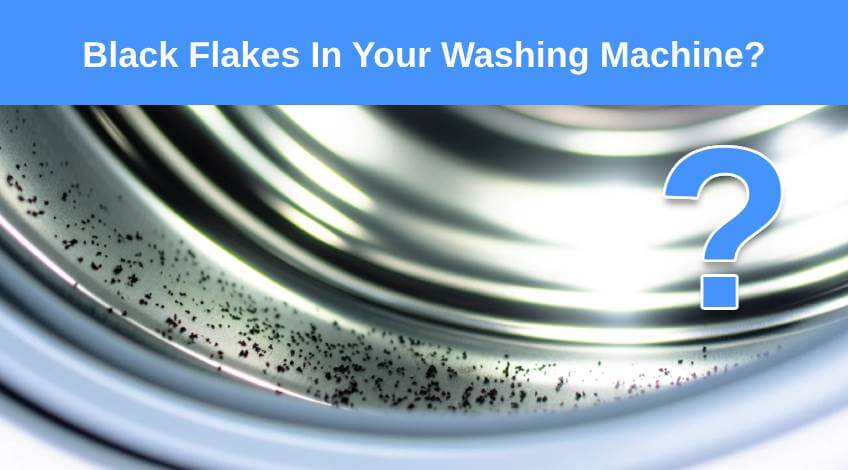
Black Flakes In Your Washing Machine? (here’s why & what to do)
Finding black flakes in your washing machine can be a bit of a shock. These mysterious particles will not only cling to your freshly laundered clothes, but may also affect the efficiency of your washing machine.
There are several reasons as to why there are black flakes in your washer. The most likely culprits would be fabric conditioner residue, rust, mineral deposits, and mould growth which can easily be solved by a thorough cleaning session.
Key Takeaways
- Black flakes can be caused by fabric softener residue, detergent residue, lint, hard water deposits, mould/mildew, rust or dirt from clothes
- It’s important to make sure you’re not using too much detergent or fabric softener, as this is one of the more common causes
- You can get rid of black flakes by regularly cleaning your washer, performing a high temperature cycle, cleaning your lint filter, switching to liquid detergents (especially in hard water areas) or using natural cleaning solutions such as lemon juice or vinegar.
Where Are These Black Flakes From?
Checking your machine to have a bit of an idea as to where the black flakes may be coming from can help you deal with the issue much easier.
You can do so by grabbing some black flakes and then rubbing them between your fingers. If they feel rubbery, it could be the flakes from your peeling clothing. If greasy, it can be hardened oil from your garments or washing machine.
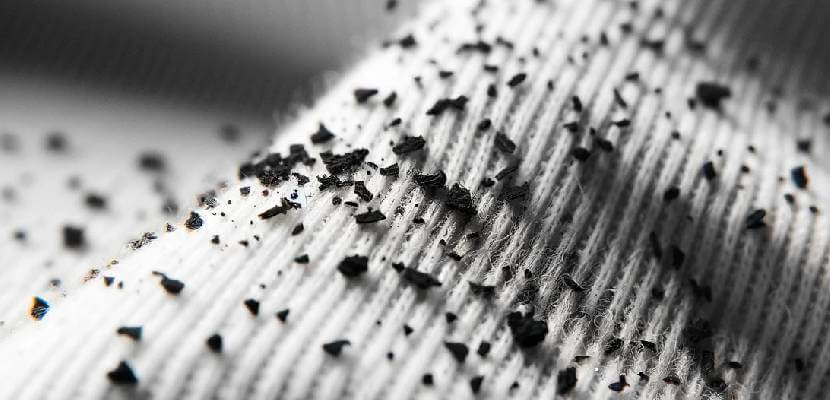
Do the flakes have an awful smell? Then there’s a chance that they’re caused by mould or mildew growth.
Knowing when the black flakes appear will also be of great help in determining the actual culprit. If they started to appear when you switched to a new laundry detergent, you may want to get another brand.
The Common Causes Of Black Flakes In The Washing Machine
Here are the different reasons why there are annoying flakes in your washing machine:
Fabric Softener Residue
We love fabric softeners. After all, who doesn’t want their clothes to be cosy to wear and awesome to smell?
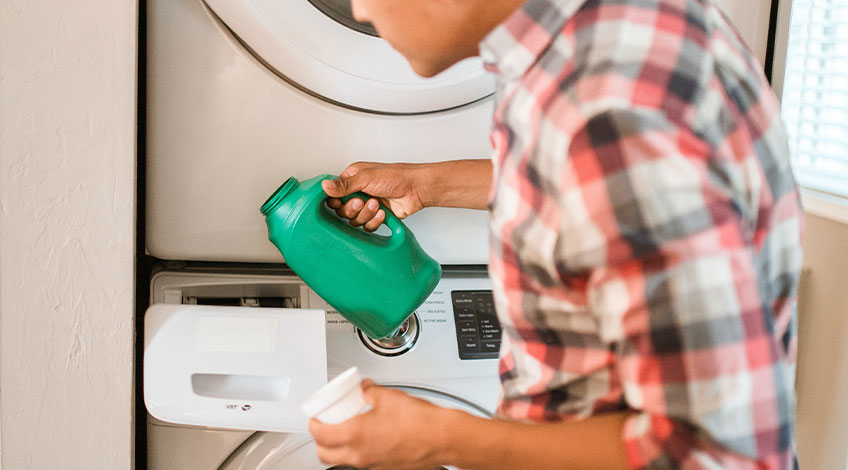
Unfortunately, excessive use can lead to the build-up of softener residues inside the washing machine. These residues can harden over time, eventually breaking off into black flakes that may cling to your clothes.
Detergent Residue
Similar to fabric softeners, using too much detergent can result in residue buildup within the washing machine. Over time, this residue can harden and flake off. This is particularly common with powder detergents in cold water cycles, as they may not dissolve completely.
TIP: Liquid detergents are easier to dissolve, which makes them less prone to causing black flakes in your washer.
Lint Build-up
Lint from clothing, towels, and other fabrics washed in the machine can accumulate over time, especially if the machine’s lint filter is not cleaned regularly.
This accumulation can lead to compacted lint deposits that will turn into black flakes. These flakes can stick to clothes or even become stuck in the washer’s components, which will affect its performance.
Hard Water Deposits
Do you live in an area that has hard water? Unfortunately, this can be the reason why there are black flakes in your washing machine and why there’s a powdery substance on your kettle and dishware.
In areas with hard water, the high mineral content (especially calcium and magnesium) can leave deposits inside the machine. These mineral deposits can build up and eventually flake off, appearing as black or dark brown specks on your laundry.
SEE ALSO: Does Hard Water Make Your Laundry Smell? (& What to Do)
Mould Or Mildew
Warm, damp environments are ideal for the growth of mould and mildew.
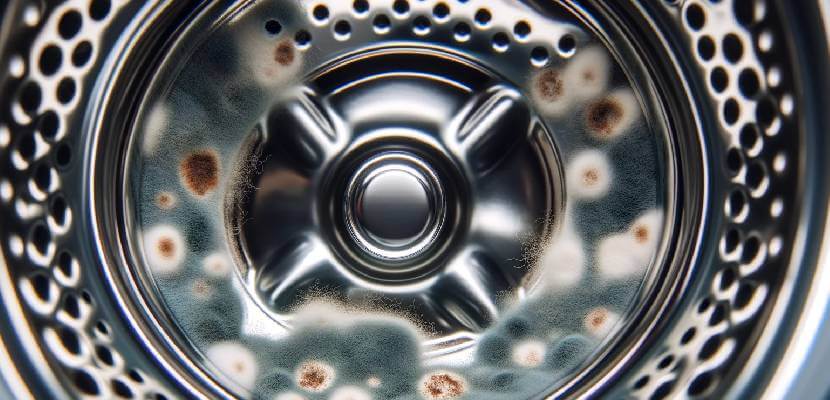
When these microorganisms already exist in your washing machine, especially its hidden corners such as its rubber seal or detergent drawer, they will appear as black flakes that often have an unpleasant smell.
Rust
If your machine is already rusting, this can be a serious concern. This often happens when the washer’s metal parts are exposed to moisture for prolonged periods, leading to oxidation.
Since most new washing machines use stainless-steel parts, this problem is more common in older machines or those that have a damaged protective coating.
Dirt From Clothes
Heavily soiled clothes can leave behind grime and dirt that accumulate inside the washing machine.
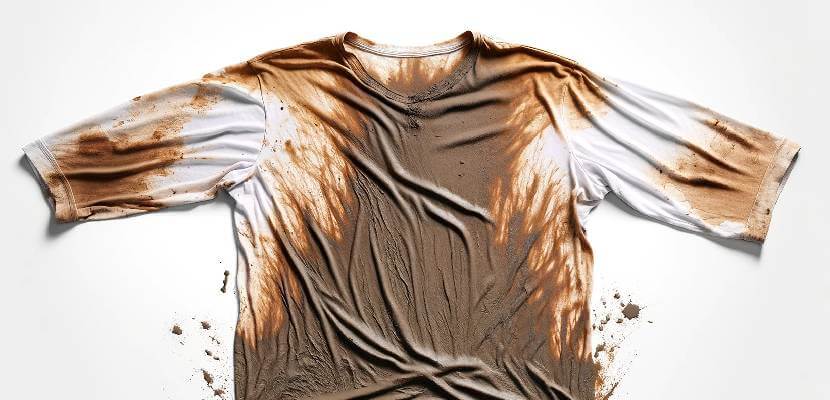
Over time, this buildup can break down into black flakes, which may not only be annoying to remove but also cause the detergent to not do its job efficiently, resulting in less clean clothes.
How To Get Rid Of Black Flakes
We know – those pesky black specks are a big annoyance to your clothing and machine.
Here are the ways to get rid of them:
Regular Cleaning
Schedule a monthly clean of your washing machine into your routine. Make sure to focus on all parts that are more prone to residue buildup, including the drum, detergent drawer, and door seal.
Use a damp cloth with a mild detergent or a specific washing machine cleaner to wipe down these areas.
High-Temperature Cycles
Every month, run an empty wash cycle at the highest temperature setting with a cup of white vinegar. This helps dissolve any hidden residues or mineral deposits, flushing them out of your washing machine.
Lint Filter Maintenance
Check your machine’s manual to locate the lint filter and clean it regularly. If it’s your first time cleaning it, make sure to follow the instructions to prevent damaging your appliance. A clogged lint filter not only contributes to the problem of black flakes, but can also reduce the efficiency of your washing machine.
Mindful Usage of Detergents and Softeners
Be mindful of the type and amount of detergent and fabric softener you use. Go for liquid detergents in hard water areas and measure the quantity according to the load size and water hardness. This prevents excessive foam and residue buildup.
Natural Cleaning Solutions
If you prefer environmentally friendly solutions, using natural acids like lemon juice or vinegar can be effective in breaking down residue and preventing mould growth. These alternatives are less harsh than chemical cleaners and can be used regularly without risking damage to your machine’s components.
Keep Your Clothes And Washer In Great Condition
Finding black flakes in your washing machine often means it’s time for a cleanup. These flakes can come from many places, like softener leftovers, rust, lint, hard water minerals, too much detergent, too many cleaning products, mould, or dirt from clothes.
By cleaning your machine regularly and using the right amount of cleaning products, you can keep your washing machine, and clothes, in good shape.
Do you have questions? Ask away!
Frequently Asked Questions
Black flakes in your washing machine are most often caused by buildup of fabric softener residue, lint, hard water deposits, rust, mould, or dirt from clothes.
To get black bits out of your washing machine, clean it regularly by running empty high-temperature cycles with vinegar, maintaining the lint filter, using natural cleaners like lemon juice or vinegar, and wiping down parts prone to buildup.
You can put bicarbonate of soda in the drum of the washing machine before adding clothes to help neutralise odours and soften water. Make sure to run an extra rinse cycle to remove any residue.
To clean a washing machine drum, use a damp cloth with a mild detergent or washing machine cleaner to wipe down all surfaces. Run empty high-temperature cycles monthly with vinegar to dissolve built-up residue.
It’s recommended to clean your washing machine thoroughly at least once a month by running a hot cycle with vinegar and wiping down any buildup. Clean the lint filter after each cycle.




